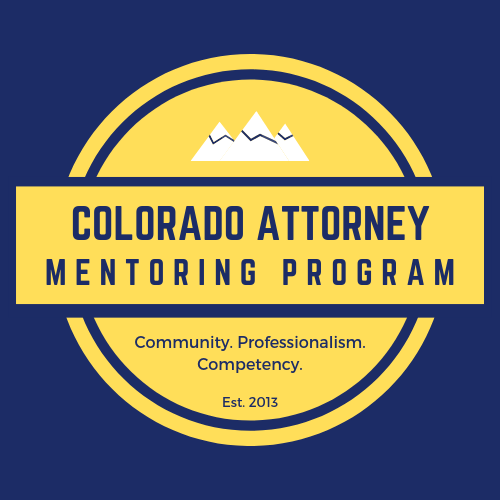The following points are intended to facilitate a discussion about balancing career and personal life, putting daily pressures into perspective, reconciling job expectations with actual experience, and maximizing career satisfaction.
- Share with the new lawyer techniques to create and maintain balance between personal and professional life. Share your own experiences, including successes and failures, in finding balance between your personal life and career.
- Discuss strategies to achieve the following components to balancing personal and professional life. (For specific strategies, seeThe Young Attorney Balancing Act: How to Have a Career and a Life (cited below.)
- How to create expectations for your employer and clients that are compatible with a healthy and balanced lifestyle.
- How to give your all at work while saving energy and emotion for family and self.
- How to maintain physical health with a busy schedule and how doing so contributes to your productivity and success.
- How to make nutritious choices at home, at work, or on the road, and how doing so maximizes performance and energy levels.
- How to plan ahead for the challenges of caring for children or aging parents.
- How to develop and maintain friendships or other relationships when time seems to be in critically short supply.
- How to foster professional relationships.
- How to be efficient and productive at work, as well as how to prioritize and delegate tasks.
- Share stress management techniques. Refer to the Mayo Clinic’s basic stress management tips, available at:http://www.mayoclinic.com/health/stress-relievers/MY01373. Discuss the article: Pat McHenry Sullivan, You Can Find Time to De-Stress, Law Practice Today, Feb. 2006,http://apps.americanbar.org/lpm/lpt/articles/mgt02064.shtml.
- Discuss how to reconcile job expectations with the actual experience at work. Discuss the new lawyer’s expectations for his or her job and the rationale(s) underlying those expectations. Does the new lawyer want to help people? Does the new lawyer want to pay off student loan debt? Does the new lawyer seek meaning in his or her professional life? Consider discussing this piece if the new lawyer is a Millennial and the answer to this last question is “yes”:http://www.nytimes.com/2013/12/01/opinion/sunday/millennial-searchers.html?_r=0. With these rationales in mind, identify the aspects of the new lawyer’s job which do not meet his or her expectations. Keeping the new lawyer’s underlying rationales in mind, determine together whether the expectations are realistic and discuss ways to make changes which will positively affect the work experience.
- Discuss ways to maintain a positive attitude at work and create a positive work environment to maximize enjoyment of work.
- Discuss the importance of identifying an individual or individuals in the work setting who can help answer questions about the culture of the office and how to balance a career with one’s personal life. If mentoring in-house, help the new lawyer identify that person (if it is not the mentor) or those people.
- Discuss ways to positively deal with the criticism of employers and clients.
- Discuss the “dos” and “don’ts” of leaving a job because of job dissatisfaction, including the following tips:
- DO work hard until you leave. If you are in the process of looking for another job, it may be easier to find one while you still have one.
- DON’T burn bridges by leaving on bad terms. You never know when and how you will have to interact with a member of your old firm in the future, or whether you will want to come back to your old firm.
- DO be careful about the reasons you say you are leaving. To keep the relationships you have built intact, keep your reasons for leaving focused on the positive growth you expect by moving on rather than the negative experience you had which caused you to want to leave.
- DON’T forget to mend difficult relationships before you go. Find something nice to say and shake hands with those you had problems with at your old employer so that you will be remembered as pleasantly as possible.
- DO stay in touch with your old employer. Maintain the good relationships you built because an old employer always has influence over your career and your reputation.
Resources:
Victoria Santoro,The Young Attorney Balancing Act: How to Have a Career and a Life, Law Practice Today (2013),http://tinyurl.com/jvwlh64.
Kleinpeter, Amy E. Clark, Balancing Life and Work, ABA YLD 101 Practice Series (2007),http://www.americanbar.org/content/dam/aba/migrated/yld/mo/balance.authcheckdam.pdf.
Sharon Meit Abrahams, 100 Plus Pointers for New lawyers on Adjusting to Your Job, ABA Publishing (2004),http://tinyurl.com/k6gyuvq.
Kathy Morris et al., Ask the Career Counselors Answers for Lawyers on Their Lives and Life’s Work, ABA Publishing (2003).
M. Diane Vogt et al., Keeping Good Lawyers: Best Practices to Create Career Satisfaction, ABA Publishing (2000).
George W. Kaufman, Lawyers Guide to Balancing Life and Work: Taking Stress Out of Success, ABA Publishing (1999).
Striving for Balance in a High Stress Job is a one hour online CLE developed by the Lawyer’s Assistance Program available at www.lapcle.org.
Colorado Attorney Mentoring Program (CAMP) Mentoring Resource Center,https://coloradomentoring.org/mentoring-resources/mentoring-literature.
Colorado Lawyer Assistance Program (COLAP) Resources,http://www.coloradolap.org.
